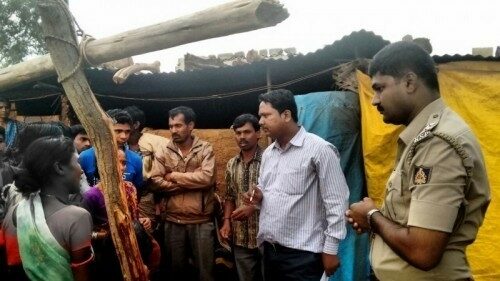IJM's Largest Operation in Bangalore Frees 260 Slaves
Slavery
In a single day, 260 people were rescued from forced labor slavery in brick factories just outside Bangalore. The remarkable operation was led by two state government officials, and is the largest rescue that IJM Bangalore has ever supported.
Each family shared stories of a harsh life in slavery. An IJM staff member recounted how one woman’s story stood out: “She told me as she was wiping her tears that she had not fed her children since morning and asked if she could have an extra box of food. She was hungry. Hungry not just for food but for freedom!”
Families Disappear, Hundreds More Found in Slavery
The operation began when families in the state of Orissa reported 60 relatives missing—possibly from human trafficking. On April 25, officials invited IJM staff to help find these families at two targeted brick kilns.
But when the rescue teams arrived at the factories, none of them were there.
“We were devastated that these people were missing, and we suspected right away there must have been a tip-off,” explained IJM’s Esther Daniel, adding, “The official in charge from Orissa instead decided to enter a few nearby brick factories and make sure the workers there were rightfully employed. What we found shocked us. Dozens of people were inside, afraid and desperate to leave.”
The officials decided to take the men, women and children to a large community center that was set up as a temporary shelter.
The families shared how they had been forced to work up to 12 hours a day, seven days a week. They were isolated from any kind of support network, hundreds of miles away from their home state. Even if they had known where to turn for help, they did not speak the local language. The rigid rules were enforced with violence and threats.
“I heard from [one group of survivors] that the owner was really brutal and abusive, I wonder what can stop this?” said one IJM staff member, adding how he was struck by the pain of these people.
“A man showed me his thigh which was purple in color (blood clot) after the owner had beaten this man and women. All I saw was that they wanted freedom.”
The Search for the Missing Families
As the interviews progressed, another IJM team worked with local police to find the missing people from the original operation.
In the early hours of Thursday morning, we received information that four of the families had been found. They explained how, the day before the rescue, they were taken away from the kiln and beaten through the night by the owner and his right-hand man.
They ran away the next morning—the very day rescue was coming to them. The families took auto rickshaws as far as their pocket change could carry them, but now they needed help. A small team mobilized quickly to bring these families to the same community center.
IJM discovered that the factory owner had forced three other families to board a train back to their home state of Orissa the morning before; after the tip-off, he was clearly afraid of being caught with slaves.
“Traffickers and business owners using bonded labor operate as if they are above the law. This is the thing we have to change—we have to show that the law is powerful. The authorities who led this operation are the change-makers and leaders of ending impunity,” explains IJM Bangalore Director Peter Williams.
Rebuilding Freedom
All 260 children, women and men returned safely to Orissa on Sunday. IJM staff were on site at the community center for around the clock for three days, making sure everyone had meals and understood what was happening. We have field staff in Orissa to help these families settle back in their communities and build safe lives in freedom.
“It was really moving to witness the families enjoy the simple pleasures in life that we take for granted—like eating, drinking water, spending time with their loved ones and even having the opportunity to rest after all that they had been through,” explained one IJM staff member.
“The joy and smiles on their faces was priceless and something that will stay with me.”
Learn how you can make a difference and stop everyday violence by watching Gary Haugen's TED Talk.